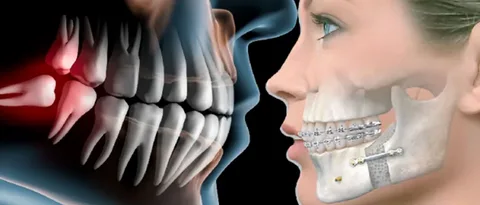Oral and Maxillofacial Surgery
- Home
- GENERAL TREATMENTS
- Oral and Maxillofacial Surgery

Oral and Maxillofacial Surgery
1- Impacted Tooth Surgeries
What is an Impacted Tooth?
Impacted teeth are teeth that fail to emerge into their normal position within the jawbone even though their eruption time has passed. The most commonly impacted teeth are the third molars (wisdom teeth), usually around age 20. Following them, the canines (cuspid teeth) can also remain impacted in the jawbone. Impacted canines in the upper front region can cause resorption of the roots of adjacent teeth or lead to misalignment of the dental arch. In some cases, impacted canines can be guided into their proper position through orthodontic treatment. However, if this is not possible and they threaten adjacent teeth, extraction may be necessary.
When Should Wisdom Teeth Be Extracted?
Cavities (Decay): Wisdom teeth are located at the back and often fail to erupt properly, making oral hygiene difficult and increasing the risk of decay. Due to their deep position and complex root canal structures, treatment is often challenging. To prevent pain, abscesses, and bad breath caused by decay, extraction is preferred.
Effects on the Second Molars: Malpositioned wisdom teeth can exert pressure on adjacent teeth or trap food debris, leading to material loss or cavities in the neighboring molars. Wisdom teeth with this potential for harm should be removed.
Pericoronitis (Gum Inflammation): Partially impacted wisdom teeth can create a space where bacteria accumulate, causing infection. Symptoms may include swelling of the face, difficulty opening the mouth, pain, bad breath, swollen lymph nodes, and fever.
Crowding of Teeth: If wisdom teeth cannot erupt in the correct position, they can exert pressure on neighboring teeth during eruption, potentially causing misalignment.
Pain: Improperly erupted wisdom teeth can press against adjacent teeth and cause discomfort.
Cyst Formation: Fully or partially impacted wisdom teeth can sometimes lead to cyst formation. These can be detected through panoramic radiographs taken during dental examinations.
Cheek Biting: Although less common, malpositioned wisdom teeth may cause patients to bite their cheeks or injure oral mucosa. Removal is recommended in such cases since these teeth do not function properly.
Cyst Surgeries
Cysts can occur in the jaws, either related to teeth or for other reasons. Untreated cysts can erode jawbone, weaken it, and eventually lead to fractures, aesthetic issues, and functional problems. To detect them early, it is recommended to have a panoramic X-ray every six months during dental check-ups.
Endodontic Surgery
In some cases, root canal treatment alone is insufficient to heal lesions at the tips of tooth roots. In such situations, endodontic surgery is performed to remove infected tissue at the root tip through a minor surgical procedure.
Dental Implants
Dental implants are artificial tooth roots, usually made of titanium, placed in areas of missing teeth for functional and aesthetic purposes. Implants are typically cylindrical titanium screws, ranging from 8mm to 16mm in length and 3mm to 5mm in diameter.
In cases of a single missing tooth, traditional bridges may require adjacent teeth to be shaved and shaped to support the prosthesis. Implants, however, preserve the surrounding teeth without any modification, which is a major advantage.
In edentulous (toothless) jaws, traditional removable prostheses may shift or cause discomfort due to tongue and muscle movements. Implant-supported prostheses provide patients with stable, natural-looking teeth and prevent jawbone resorption. By maintaining bone structure, facial contours are preserved, and patients can bite and chew normally, enjoying foods like apples or steak. The fixed, natural appearance of implants also boosts patient confidence and quality of life.
Dental implants can be applied to any healthy individual whose jaw growth is complete. Implant longevity depends on factors like general health and oral hygiene, with some lasting up to 30 years. Scientific studies show success rates of 90–100% for dental implants.
Implant procedures are performed under local anesthesia and typically last about 30 minutes, completely painless. Swelling may occur for up to 3 days post-surgery. Patients usually receive their permanent prostheses 3–6 months after implant placement, during which the implant integrates with the bone. Temporary prostheses may be used in the meantime if recommended by the dentist.
Implant treatment is generally more costly than other dental procedures due to the high-tech, imported components used.
Tags: Oral and Maxillofacial Surgery, Batman Oral and Maxillofacial Surgery, Kerim Dental
